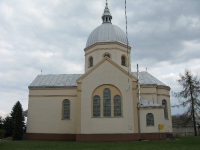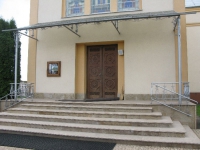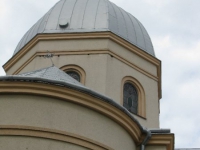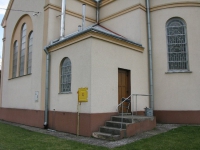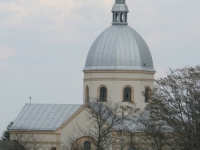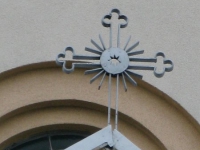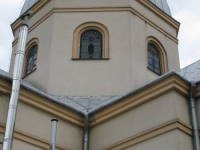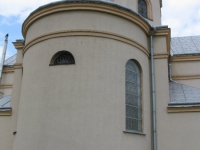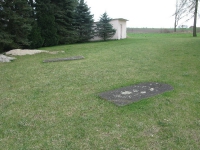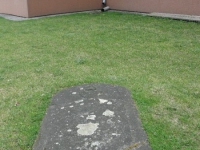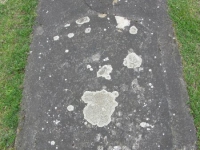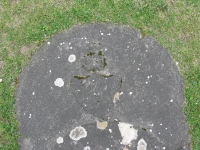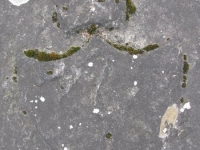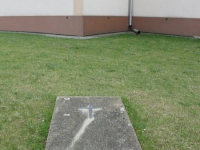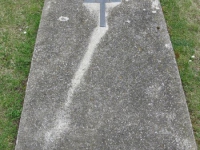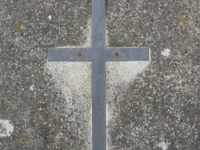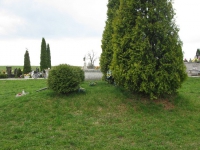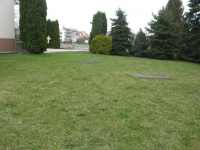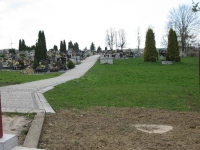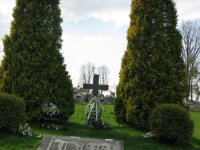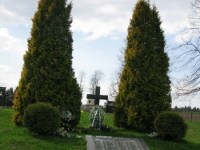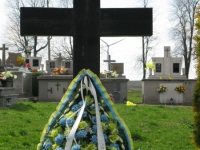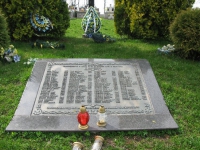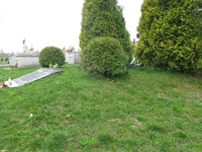Refer to original source: - computer translationМАЛКОВИЧІ (Polish: Małkowice) - until 1947 a Ukrainian village in the Przemyśl poviat. In 1939, it had 1,170 inhabitants, including 1,020 Ukrainians, 100 Poles (including 50 recent colonists), 70 Ukrainian-speaking Roman Catholics, 10 Jews [Kubijowycz, 56].DOCUMENTS OF THE MURDER IN UJKOWICE IN 19451950 October 28, Przemyśl - Fragment of the protocol of Franciszek Angel's interrogation by Eugeniusz Jędzrzec, PUBP investigator in PrzemyślQuestion: Who took part in the murderous action in the Ujkowice cluster, who organized this action and what were its results?Answer: I do not remember exactly whether it was in 1944 or in 1945 in the winter season, one day I was notified, but I do not remember by whom to turn up in the evening hours at the house of ob. Michał's Partyki, residing in Orły, because we will go to action in the Ujkowice community, then at the appointed time on the same day, when it was already dark, I went to the indicated place, which was Partyka Michał's house in Orły. After going inside, I met Kozak Stanisław there, now in the west, Gałuszek Stanisław, in the west, Machowski Józef, currently at school, but what, I do not know, NN Janina, I do not know the surname [...] and several other individuals whom I did not know I do not know his name because they were people from the east.That is why we started walking in groups towards Ujkowice. I, Machowski Józef and Gałuszka Stanisław went in the cart, and when we arrived in Ujkowice, we met with the whole group, except that unknown individuals were waiting for us - about 5 people. These people were already planned in advance as guides, i.e. they showed us the places where the assassination and robbery should be carried out. Our group consisted of about 15 people who were armed with firearms [...].After coming to the Ujkowice group, we all went to the Ukrainian priest (Pope), the house was covered with the abovementioned Janek, and the Pope was not there. I was standing there, who was inside, I don't remember, I know that Janka was mentioned there and that was where two people were shot. After the murder, we took the wardrobe and went to the next house, but to whom, I do not know, and just that night a dozen or so people were murdered, and we took the property of the murdered people on a cart and drove home. […] Copy, typescript. IPN-Rz-050/124, vol. 2, sheet 15.1950 November 8, Przemyśl - Fragment of the protocol of Antoni Sanocki's interrogation by the PUBP investigative officer in Przemyśl, Sec. Henryka Beresa[...] In the early days of the spring of 1945, one day, Kisiel Roman arrived for Dźwierzyński Jan with his robber group, which he had brought from the area of the Nienadowa community, Dubiecko commune. After the arrival of the Dźwierzyński's group, Jan distributed the members of this group among the hosts to the quarters and the night time of that day, Dźwierzyński Jan, Anioł Franciszek and Kisiel Roman brought and agreed on a plan to pacify the Małkowice cluster, and then divided the group of about 150 people armed with various weapons into subgroups, giving each of them a task.The same night, in the Małkowice cluster, this group murdered about 120 people, not distinguishing women, children or even old people, the property of the murdered was loaded onto carts and drove off towards the Nienadów cluster. Dźwierzyński Jan, accompanied by Kisiel Roman, watched the course of the action, standing on the road next to the Małkowice cluster. On the other hand, Angel Francis was with the whole group on the action. While observing the result of the action, he saw the returning group of Kisiel Roman, which [escorted] the stolen cows and about 50 carts loaded with belongings. [...] IPN-Rz-050/124, vol. 1, sheet 32.1950 November 29, Przemyśl - Fragment of the report of the interrogation of suspect Jan Dźwierzyński by Stanisław Jędrys, WUBP investigator in Rzeszów[...] Question: Explain the activities of the BCh organization after the liberation of Poland. […] Answer: […] The next action took place in Ujkowice […], as a result of this action about 10 people were murdered and their property was stolen. Copy, typescript. IPN-Rz-050/124, vol. 1, sheet 67.1950 November 29, Przemyśl - Fragment of the protocol of interrogation of Franciszek Angel by Corporal Stanisław Jędrys, investigator of WUBP RzeszówQuestion: explain in detail your activity in the organization of BCh during the occupation and after the liberation.Answer: […] After the liberation, Kisiel Roman ps. "Sęp", from among the members of the Peasant Battalions organization, organized the Citizens' Militia in the Przemyśl poviat [...]. Then I took part in an armed robbery on the village of Małkowice. It was the spring time of 1945. Kisiel Roman came to the Eagles group with his gang from Dubiecko, notifying me through one of the gang members to prepare for the action and report to the Hnatkow colony in the evening. So on the same day in the evening I took with me a PP-sz machine with two spare magazines and a TT pistol with a spare magazine and went to the gang quartering in the Hnatkow colony. After arriving, I found Łuczyk, Antoni, Czekierd Florian, Kozak Stanisław, Jedrzejec Eugeniusz, Dobrowolski Henryk, Chac Karol, they all lived in the Orły district, Przemyśl poviat, and [people] from Małkowice were also supposed to participate, but I cannot say that, because I did not see them. At that time, the command of this action was held by Kisiel Roman and Dorosz Franciszek. Then I gave my automaton to Łuczek Antoni, and I, ie Angel Franciszek, took RKM, receiving an order from Kisiel Roman about 12 people under my command [and] I went to the cast of the village of Małkowice from the village of Orły. On the other hand, the remaining members of the gang entered the village of Małkowice in order to pacify the Ukrainian population. After about two hours, a shooting started, as a result of which a lot of people were shot, but I do not know how many, but our task at the guard was, if someone escaped from this village, shoot him. This action lasted about 4 hours, after which the gang left Przemyśl poviat in the direction of Trójczyce, while the other participants of this action from the Eagles group went home in their own right […]. I would like to mention that during this action a lot of things were stolen, which Kisiel's gang took with them.At the same time, after a month and an agreement with me, Angel Franciszek, with the gang from the village of Kozienice, to show them the way to the village of Zadąbrowie, Jarosław district. On the same day, I notified [...] a few individuals, whose names I do not know from the East, to gather in the village of Orły and join the gang from Kozienice, so according to the agreed data, that evening we met and went to Zadąbrowie, Jarosław County. After the attack took place, we robbed about 15 head of cattle from Ukrainian farmers [...].In the summer season, in June 1945, I was notified by Dźwierzyński Jan, who was then the commander of the MO post in Orzechowce, to go to the village of Hnatkowice and help distribute stolen cattle from the Walawa pasture. [...] these cattle were stolen from the pasture of Walawa and belonged to the Ukrainian population. We divided the cattle into groups and the next day we distributed them to the villages and sold them for money. The sale order was given by Dźwierzyński, while the money was sent to Kisiel Roman, who paid all the gang members for this job [...]. Copy, typescript. IPN-Rz-050/124, vol. 1, sheets 61-62.1950 November 29, Przemyśl - Fragment of the report of the interrogation of suspect Jan Dźwierzyński by Stanisław Jędrys, WUBP investigator in Rzeszów[...] Question: Explain the activities of the BCh organization after the liberation of Poland.Answer: [...] In 1945, in the spring time [...] Kisiel Roman came again with his band of about 150 people from Dubiecczyzna, with whom Dorosz Franciszek, second-lieutenant, who commanded the entire group as the commander of a subversive group, arrived, Bartek, second-lieutenant, commander of socialist [specialized? - BH] PPS to the Eagles group, they quartered for one day, and here Kisiel organized people from Orły who wanted to go, so Angel Franciszek, armed with the RKM, which was owned by the org. BCh, Łuczyk Antoni, Lichtarski Franciszek and a few people unknown to me, whom Kisiel kept in grom. Orły., From other areas and on the same day in the evening they went to the Małkowice community, where, after the operation was carried out, about one hundred and two Ukrainian people were murdered and all their property was stolen, from where in the morning of the second day they left for Dubiecczyzna. […]Copy, typescript. IPN-Rz-050/124, vol. 1, sheets 66-67.1950 December 4, Przemyśl - Fragment of the protocol of the interrogation of Franciszek Anioł by Stanisław Jędrys, the investigating officer of the WUBP in Rzeszów.Question: Where did you take part in the attack for the first time and what weapons and who were more?Answer: For the first time in a robbery [I took part], armed with a TT and RKM pistol, I took part in the village of Małkowice in the spring of 1945. This attack was carried out on the orders of Kisiel Roman, Dorosz Franciszek in consultation with me, namely On that day, Kisiel came to the Eagles' group with his band of about 40 people, armed with machine guns, automatic weapons, ordinary rifles and pistols, they quartered in the Hnatkowska Colony [...]. After everyone got together, Kisiel or Dorosz made a collection and preceded where someone was to go to, then Kisiel appointed me a commander and I was afraid of 12 people at my disposal [...], I went to guard between the village of Orły and Małkowice [...]. After arriving at the site, I left them at a distance of 30 to 100 meters from each other, the whole village of Małkowice was surrounded this way, and I was the first to set off. In the second such unit, there was Chac Karol from RKM and Czekierda with other RKM. This unit marched to the guard from the Żurawica side, while from Małkowice the eastern and northern side were to be guarded by the members of the gang, but I do not know who, because I never went to attacks with them. Let me mention that before he left his position, Kisiel gave the order that no one of his friends or locals would dare to go inside the village for fear of being recognized. After leaving for the guard, the rest of the gang, headed by Kisiel Roman and Dorosz, were to enter the village and carry out the action, but I do not know what it looked like, because I was at that time. and later I heard shooting and screams in the middle of the village, and a fire broke out from the east. This action lasted about 4 hours, as a result of which, as I found out later, 130 people were shot and the property of the murdered was stolen for a few carts. After this action, a meeting took place on the road near the road from Małkowice [...].Copy, typescript. IPN-Rz-050/124, vol. 1, sheet 94.1950 December 4, Przemyśl - Fragment of the protocol from the interrogation of Mikołaj Lech by Stanisław Jędrys, the investigating officer of the WUBP in Rzeszów. Question: Give what you know about the activities of Dzwierzyński Jan and his robbery after the liberation. Answer: […] After some time, an action was carried out again in the village of Ujkowice on the order of Angel Franciszek, in which the same people took part, which I already told, where a Russian priest and his wife were shot by Lichtarski Franciszek […]. […] Copy, typescript. IPN-Rz-050/124, vol. 1, sheet 98.Report of Sofia Iłyk, born on 1933[...] It was April 1, 1945 [incorrect date: the mass murder in Małkowice took place on the night of April 17-18, 1945 - BH]. That evening, my father went to watch. The mother put the older children to sleep while she was rocking the baby herself. We couldn't fall asleep, finally my mother said: "Get up and go to the old men, because there is a fire in the village and you can hear shots." […]The four of us got out to the attic, and the mother with the baby at her breast remained downstairs. I don't remember how much time she spent there, but I do remember the fire, the glow and the arrows, and the terrible chill. We were just about to go downstairs when the glass shattered, I heard screams and knocks on the window frames and door. Someone started to climb up to the attic. It was our mother who, after the gun's blows on the windows and broken windows, understood: people were murdered. She didn't have time to take Oleg, left him downstairs and hauled the ladder up behind her. At that moment, the door fell out from the blows of the butts and the beam of light fell on the walls and the end of the ladder. We heard: "Get off. Who's there?". Mom lowered the ladder. The bandits, 5-6 men dressed in Soviet uniforms, went to the attic and asked if anyone else was there. - The children are - says mom.- Let them come off. We all went downstairs and, holding our breath, entered the room. - I am Polish - says my mother. [The bandits] gave the order to show the Kennkarte. Mam began to look everywhere, but did not find it. - Where's the husband? They asked. - A Ukrainian husband, he went to his mother in Radymno, because his mother was very sick.[Bandits] started throwing all things from the bed to the ground, rummaging in wardrobes, they went to the kitchen. They did not want to believe that my mother was Polish. We all stood in a row waiting to die. I was the last one, I was rocking the baby, my mother was the first. The woman who came with the bandits approached her from the machine. "Leave. It may be that she is Polish, ”said one of them. The bandits abandoned us and left. Mom immediately found the Kennkarte and put it in the wardrobe, then picked up the quilt from the floor, which showed traces of bloody shoes. [...] Polish bandits left the village after a bloody feast. That night, they murdered everyone they found at home, unable to find hiding. Among the murdered were old people and children. In the neighboring house, the Poles murdered an old woman, her little girl, a 5-year-old boy and a 4-month-old baby in a cradle, whom they put a knife in the forehead [it is about the family of Dmitri Pitula - BH]. […]My relatives were killed then - the Wojtas family: my aunt Tatiana, her husband Mikołaj, 15-year-old daughter Petronelka and 12-year-old son Lubomir. All four lay under the threshold, a trickle of blood flowing from their bodies. […] Many people were killed then. The funeral took the entire next day. […] Source: Deportaciji. Spohady, vol. 3, Lviv 2002, pp. 81–82. Translation: Bogdan Huk.Account by Myrosław Padowski, b. 1934[...] During the tragic night of April 17-18, 1945, no one came to defend us. […] Then […] in my village of Małkowice there was a mood of fear, dogs howled. My mother was taking the ready-made bread out of the oven ... At night she woke me up and started dressing me in a hurry, but she couldn't, because we heard shots and screams. We tried to escape to the attic, but in the meantime someone burst into the house and shots at the ceiling forced us to go downstairs. The house was being raided by three armed bandits, and their father was explaining to them. They lit the lamp and their father handed them some documents. [...] He said he was a Pole, but [bandits] answered him: "We know that Poles do not live here." They ordered to lie down on the ground. The father, pointing to me, asked them to spare his life, because he has to raise a child. Did not help. One of the attackers removed a rifle from his shoulder and shot his father in the head. Then he shot his mother sitting at the table. I have seen these arrows, similar to the flashes of matches. The second bandit held a lamp over his head and shone it. Then everyone ran out of the house, smashed the butt of two panes in the window in front of me, so I fell to the ground, I thought they had shot at me.I don't remember how long I lay there. I felt cold, I was wearing only pants, a T-shirt. The feeling of cold helped me understand that I was alive, and it got me up. I saw my jacket in my mother's hands and went to take it, but it was difficult because my breasts pressed it against her knees. Pulling out my clothes, I touched the still warm blood with my hand. It sobered me up and I started screaming. I fell silent when I heard a beating on the door to the hall and ran through the second door to the orchard, in the ditch at the end of the orchard I lay down on thin ice.I saw the corner of my neighbor's house, Dmitri Winiar. Just then, one of the attackers was pushing a rifle into Marie Winiar's stomach, she begged him and screamed, to which he replied: "Be quiet, fuck you." After a while, he shot her in the stomach twice and disappeared somewhere. I went to the yard of Winiary, approached the wounded Maria, who was walking across the yard dripping with blood. In fear, I asked, "How can I help you, Mummy?" Her two daughters wept immediately: six-year-old Darcia and two-year-old Marysia. They were both injured. One to the left and the other to the right hand. Two women came running, took Maria Winiar by the arms and led her home. I was left alone, no one was interested in me ...In the attic, dying Winiar Dimitri groaned heavily, houses were burning far in the village, there were sounds of gunfire and lamentation. I was standing and freezing, I was afraid to go home. I ran to the village to Fronec (a man who had a garden next door to us). Running through Strymiński's yard, I heard a terrible groan. Someone 's feet in shoes stuck out from the door of Kwarciana's house… […] Source: Deprotaciji. Spohady, vol. 3, Lviv 2002, pp. 85–86. Translation: Bogdan Huk.Excerpt from Iwan Iłyczka's account of the murder of Ukrainians in Małkowice [...] In 1945, during Lent, Poles planned an action against people in the church during the Holy Mass. A resident of the village, Hrynda, on the eve of [the action] was taking the head of the village of Orzechowce with the secretary to Przemyśl for the session. He overheard them talking about their "affairs." Hrynda told the priest about their conversation, and he told the people. Nobody wanted to believe Hrynda's words. The priest, however, was very scared and celebrated the liturgy during the day. When Poles came to the church, no one was there, they went through the village to kill and rob their property. […]After supper, I went to bed right away, because after midnight I was supposed to keep watch after my father. It was like that every night: we were afraid that the Poles would suddenly find us. Our whole family was at home: father, mother, me, brothers Omelan and Anton, sister Stefa, mother sister Kateryna. In the evening, my neighbor, Tacjan Łabuza, came with her 7-year-old daughter.They often stayed with us. I was awakened by a knocking on the window next to which I was sleeping. Kateryna Chmielowska shouted: "Run away, because the Poles are murdering Ukrainians in the village!" I managed to surprise me from a bamboo and put on my pants, when I heard a gunshot near our house - Kateryna Chmelowska was shot near our house. I was very scared, I wanted to run out of the window, but I saw a fire and thought our house was on fire. We hid with my father's bed. My father explained to me that it was not our house that was on fire, but his brother Theodore's barn. At first, the Poles shot at the walls of our house. No one spoke, so they broke the kitchen window and climbed into the house. At the same time, a gunshot rang out and we heard terrible screams. The next morning I found out that they had murdered our neighbor Łabuza and her daughter. My father and I thought that the Poles also killed my mother,The Poles then entered the room where my father and I were and began to shine under the Bambetel. I prayed to the Blessed Virgin and it so happened that the Poles did not look under the bed, but began to take everything out of the chest and wardrobe, then opened the door to the hall, the front door and the door to the third room. They saw the horses but didn't take them. They went to the bed and lit a straw. There was over 40 kg of sugar in the straw mattress, which began to melt and drip on us. Together with my father, we may not have abandoned our shelter, because the melted sugar was baking a lot. Dad went to the hall, but a Pole saw him and shot him. I don't remember jumping out of the door and starting to run. I was running through the garden of my uncle Ivan Iłyczka. I saw that he was carrying out the flour and shouted, "Uncle, run away! They all killed us! ”. He immediately ran somewhere in the field, and I ran to the village. I jumped on the road, meeting my cousin Wasyl Iłyczka (born in 1934) with sister Olha (born in 1930), who was growing on the hands of brother Stepan (born in 1942). They scared me very much because I was splashed with my father's blood. Vasyl went with me, and Olha ran home after her father, Teodor Iłyczka. Without finding him at home, she returned to the street, where the Poles were already chasing them to the house of their neighbor, Ivan Wołos, where they had already murdered the whole family: Ivan, his wife Ksenia, son Omelan (born in 1932) and daughter Marusia (born in 1936). When Olha entered Wołos's house, a Polish woman named Dobrowolska shot her in the back of the head. The sister fell on the bed with her brother in her arms. The Polish woman fired several more times. The sister had a thick headscarf, which saved her. One of the bullets hit Brother Stepan in the leg. Poland was furious,When the Poles left Wołos's house, the injured Olha got up, took her brother in her arms and carried him to my father's sister, Kateryna Andruch, where I ran with my cousin Wasyl. The Poles hadn't reached it yet, but as soon as we went out to the attic and closed the door behind us, we heard Polish voices.Grandpa Andruch, on my advice, left the front door open. The Poles entered the house, saw that there was nobody there and nothing to steal (we took everything to the attic), so they started breaking the dishes out of anger. When they entered the hall, Grandpa Andruch grasped the ax in his hands and said: "If he goes to the attic, I will earn a dog, even if it was one of our innocent people."Fortunately, they moved away. We looked at the court through the door in the attic and saw how Stepan Połujka's daughter Maria and her sister were walking along the road. A Pole, standing on watch, told her: "Go get on the roof or they will kill you." This one immediately jumped into a pit nearby and was sitting there. The Pole apparently was a good man and did not want to take sin as a soul.After the Andruchów house, the Poles went to the house of Dmytro Pitula, who was mobilized at that time into the army, killing his mother, wife Hanna, and two children. The next morning, Pitula, who was wounded at the front and was going to the hospital by sanitary train through Przemyśl, escaped from the wagon and ran home to say that he was alive: he saw all the dead. […]Source: Sr. Małkowyczi , in: Deportaciji …, vol. 3: Spohady , Lviv 2002, pp. 83–84.HISTORYHERITAGE OF UKRAINIAN MATERIAL CULTUREThe results of the monitoring of May 2015.https://www.apokryfruski.org/kultura/nadsanie/malkowice/#CHURCH CEMETERY near the church - former COMMEMORATIONAll crosses on Ukrainian graves before 1945 in the former parish cemeteries were destroyed. Their number is unknown. At the beginning of the 1990s, a commemoration of the victims of the mass murder of April 1945, carried out by the Polish partisan unit and volunteers, was established.">www.apokryfruski.org/kultura/nadsanie/malkowice/#
Małkowice - computer translation
МАЛКОВИЧІ (Polish: Małkowice) - until 1947 a Ukrainian village in the Przemyśl poviat.
In 1939, it had 1,170 inhabitants, including 1,020 Ukrainians, 100 Poles (including 50 recent colonists), 70 Ukrainian-speaking Roman Catholics, 10 Jews [Kubijowycz, 56].
DOCUMENTS OF THE MURDER IN UJKOWICE IN 1945
1950 October 28, Przemyśl - Fragment of the protocol of Franciszek Angel's interrogation by Eugeniusz Jędzrzec, PUBP investigator in Przemyśl
Question: Who took part in the murderous action in the Ujkowice cluster, who organized this action and what were its results?
Answer: I do not remember exactly whether it was in 1944 or in 1945 in the winter season, one day I was notified, but I do not remember by whom to turn up in the evening hours at the house of ob. Michał's Partyki, residing in Orły, because we will go to action in the Ujkowice community, then at the appointed time on the same day, when it was already dark, I went to the indicated place, which was Partyka Michał's house in Orły. After going inside, I met Kozak Stanisław there, now in the west, Gałuszek Stanisław, in the west, Machowski Józef, currently at school, but what, I do not know, NN Janina, I do not know the surname [...] and several other individuals whom I did not know I do not know his name because they were people from the east.
That is why we started walking in groups towards Ujkowice. I, Machowski Józef and Gałuszka Stanisław went in the cart, and when we arrived in Ujkowice, we met with the whole group, except that unknown individuals were waiting for us - about 5 people. These people were already planned in advance as guides, i.e. they showed us the places where the assassination and robbery should be carried out.
Our group consisted of about 15 people who were armed with firearms [...].
After coming to the Ujkowice group, we all went to the Ukrainian priest (Pope), the house was covered with the abovementioned Janek, and the Pope was not there. I was standing there, who was inside, I don't remember, I know that Janka was mentioned there and that was where two people were shot. After the murder, we took the wardrobe and went to the next house, but to whom, I do not know, and just that night a dozen or so people were murdered, and we took the property of the murdered people on a cart and drove home. […]
Copy, typescript. IPN-Rz-050/124, vol. 2, sheet 15.
1950 November 8, Przemyśl - Fragment of the protocol of Antoni Sanocki's interrogation by the PUBP investigative officer in Przemyśl, Sec. Henryka Beresa
[...] In the early days of the spring of 1945, one day, Kisiel Roman arrived for Dźwierzyński Jan with his robber group, which he had brought from the area of the Nienadowa community, Dubiecko commune. After the arrival of the Dźwierzyński's group, Jan distributed the members of this group among the hosts to the quarters and the night time of that day, Dźwierzyński Jan, Anioł Franciszek and Kisiel Roman brought and agreed on a plan to pacify the Małkowice cluster, and then divided the group of about 150 people armed with various weapons into subgroups, giving each of them a task.
The same night, in the Małkowice cluster, this group murdered about 120 people, not distinguishing women, children or even old people, the property of the murdered was loaded onto carts and drove off towards the Nienadów cluster. Dźwierzyński Jan, accompanied by Kisiel Roman, watched the course of the action, standing on the road next to the Małkowice cluster. On the other hand, Angel Francis was with the whole group on the action. While observing the result of the action, he saw the returning group of Kisiel Roman, which [escorted] the stolen cows and about 50 carts loaded with belongings. [...]
IPN-Rz-050/124, vol. 1, sheet 32.
1950 November 29, Przemyśl - Fragment of the report of the interrogation of suspect Jan Dźwierzyński by Stanisław Jędrys, WUBP investigator in Rzeszów
[...] Question: Explain the activities of the BCh organization after the liberation of Poland. […]
Answer: […] The next action took place in Ujkowice […], as a result of this action about 10 people were murdered and their property was stolen.
Copy, typescript. IPN-Rz-050/124, vol. 1, sheet 67.
1950 November 29, Przemyśl - Fragment of the protocol of interrogation of Franciszek Angel by Corporal Stanisław Jędrys, investigator of WUBP Rzeszów
Question: explain in detail your activity in the organization of BCh during the occupation and after the liberation.
Answer: […] After the liberation, Kisiel Roman ps. "Sęp", from among the members of the Peasant Battalions organization, organized the Citizens' Militia in the Przemyśl poviat [...]. Then I took part in an armed robbery on the village of Małkowice. It was the spring time of 1945. Kisiel Roman came to the Eagles group with his gang from Dubiecko, notifying me through one of the gang members to prepare for the action and report to the Hnatkow colony in the evening. So on the same day in the evening I took with me a PP-sz machine with two spare magazines and a TT pistol with a spare magazine and went to the gang quartering in the Hnatkow colony.
After arriving, I found Łuczyk, Antoni, Czekierd Florian, Kozak Stanisław, Jedrzejec Eugeniusz, Dobrowolski Henryk, Chac Karol, they all lived in the Orły district, Przemyśl poviat, and [people] from Małkowice were also supposed to participate, but I cannot say that, because I did not see them. At that time, the command of this action was held by Kisiel Roman and Dorosz Franciszek.
Then I gave my automaton to Łuczek Antoni, and I, ie Angel Franciszek, took RKM, receiving an order from Kisiel Roman about 12 people under my command [and] I went to the cast of the village of Małkowice from the village of Orły.
On the other hand, the remaining members of the gang entered the village of Małkowice in order to pacify the Ukrainian population. After about two hours, a shooting started, as a result of which a lot of people were shot, but I do not know how many, but our task at the guard was, if someone escaped from this village, shoot him. This action lasted about 4 hours, after which the gang left Przemyśl poviat in the direction of Trójczyce, while the other participants of this action from the Eagles group went home in their own right […]. I would like to mention that during this action a lot of things were stolen, which Kisiel's gang took with them.
At the same time, after a month and an agreement with me, Angel Franciszek, with the gang from the village of Kozienice, to show them the way to the village of Zadąbrowie, Jarosław district. On the same day, I notified [...] a few individuals, whose names I do not know from the East, to gather in the village of Orły and join the gang from Kozienice, so according to the agreed data, that evening we met and went to Zadąbrowie, Jarosław County. After the attack took place, we robbed about 15 head of cattle from Ukrainian farmers [...].
In the summer season, in June 1945, I was notified by Dźwierzyński Jan, who was then the commander of the MO post in Orzechowce, to go to the village of Hnatkowice and help distribute stolen cattle from the Walawa pasture. [...] these cattle were stolen from the pasture of Walawa and belonged to the Ukrainian population.
We divided the cattle into groups and the next day we distributed them to the villages and sold them for money. The sale order was given by Dźwierzyński, while the money was sent to Kisiel Roman, who paid all the gang members for this job [...].
Copy, typescript. IPN-Rz-050/124, vol. 1, sheets 61-62.
1950 November 29, Przemyśl - Fragment of the report of the interrogation of suspect Jan Dźwierzyński by Stanisław Jędrys, WUBP investigator in Rzeszów
[...] Question: Explain the activities of the BCh organization after the liberation of Poland.
Answer: [...] In 1945, in the spring time [...] Kisiel Roman came again with his band of about 150 people from Dubiecczyzna, with whom Dorosz Franciszek, second-lieutenant, who commanded the entire group as the commander of a subversive group, arrived, Bartek, second-lieutenant, commander of socialist [specialized? - BH] PPS to the Eagles group, they quartered for one day, and here Kisiel organized people from Orły who wanted to go, so Angel Franciszek, armed with the RKM, which was owned by the org. BCh, Łuczyk Antoni, Lichtarski Franciszek and a few people unknown to me, whom Kisiel kept in grom. Orły., From other areas and on the same day in the evening they went to the Małkowice community, where, after the operation was carried out, about one hundred and two Ukrainian people were murdered and all their property was stolen, from where in the morning of the second day they left for Dubiecczyzna. […]
Copy, typescript. IPN-Rz-050/124, vol. 1, sheets 66-67.
1950 December 4, Przemyśl - Fragment of the protocol of the interrogation of Franciszek Anioł by Stanisław Jędrys, the investigating officer of the WUBP in Rzeszów.
Question: Where did you take part in the attack for the first time and what weapons and who were more?
Answer: For the first time in a robbery [I took part], armed with a TT and RKM pistol, I took part in the village of Małkowice in the spring of 1945. This attack was carried out on the orders of Kisiel Roman, Dorosz Franciszek in consultation with me, namely On that day, Kisiel came to the Eagles' group with his band of about 40 people, armed with machine guns, automatic weapons, ordinary rifles and pistols, they quartered in the Hnatkowska Colony [...]. After everyone got together, Kisiel or Dorosz made a collection and preceded where someone was to go to, then Kisiel appointed me a commander and I was afraid of 12 people at my disposal [...], I went to guard between the village of Orły and Małkowice [...]. After arriving at the site, I left them at a distance of 30 to 100 meters from each other, the whole village of Małkowice was surrounded this way, and I was the first to set off.
In the second such unit, there was Chac Karol from RKM and Czekierda with other RKM. This unit marched to the guard from the Żurawica side, while from Małkowice the eastern and northern side were to be guarded by the members of the gang, but I do not know who, because I never went to attacks with them.
Let me mention that before he left his position, Kisiel gave the order that no one of his friends or locals would dare to go inside the village for fear of being recognized. After leaving for the guard, the rest of the gang, headed by Kisiel Roman and Dorosz, were to enter the village and carry out the action, but I do not know what it looked like, because I was at that time. and later I heard shooting and screams in the middle of the village, and a fire broke out from the east. This action lasted about 4 hours, as a result of which, as I found out later, 130 people were shot and the property of the murdered was stolen for a few carts. After this action, a meeting took place on the road near the road from Małkowice [...].
Copy, typescript. IPN-Rz-050/124, vol. 1, sheet 94.
1950 December 4, Przemyśl - Fragment of the protocol from the interrogation of Mikołaj Lech by Stanisław Jędrys, the investigating officer of the WUBP in Rzeszów.
Question: Give what you know about the activities of Dzwierzyński Jan and his robbery after the liberation.
Answer: […] After some time, an action was carried out again in the village of Ujkowice on the order of Angel Franciszek, in which the same people took part, which I already told, where a Russian priest and his wife were shot by Lichtarski Franciszek […]. […]
Copy, typescript. IPN-Rz-050/124, vol. 1, sheet 98.
Report of Sofia Iłyk, born on 1933
[...] It was April 1, 1945 [incorrect date: the mass murder in Małkowice took place on the night of April 17-18, 1945 - BH]. That evening, my father went to watch. The mother put the older children to sleep while she was rocking the baby herself. We couldn't fall asleep, finally my mother said: "Get up and go to the old men, because there is a fire in the village and you can hear shots." […]
The four of us got out to the attic, and the mother with the baby at her breast remained downstairs. I don't remember how much time she spent there, but I do remember the fire, the glow and the arrows, and the terrible chill. We were just about to go downstairs when the glass shattered, I heard screams and knocks on the window frames and door. Someone started to climb up to the attic. It was our mother who, after the gun's blows on the windows and broken windows, understood: people were murdered. She didn't have time to take Oleg, left him downstairs and hauled the ladder up behind her. At that moment, the door fell out from the blows of the butts and the beam of light fell on the walls and the end of the ladder. We heard: "Get off. Who's there?" Mom lowered the ladder. The bandits, 5-6 men dressed in Soviet uniforms, went to the attic and asked if anyone else was there.
"The children are," says mom.
"Let them come down." We all went downstairs and, holding our breath, entered the room.
"I am Polish," says my mother.
[The bandits] gave the order to show the Kennkarte [proof]. Mom began to look everywhere, but did not find it.
"Where's the husband?" they asked.
"A Ukrainian husband, he went to his mother in Radymno, because his mother was very sick."
[Bandits] started throwing all things from the bed to the ground, rummaging in wardrobes, they went to the kitchen. They did not want to believe that my mother was Polish. We all stood in a row waiting to die. I was the last one, I was rocking the baby, my mother was the first. The woman who came with the bandits approached her from the machine.
"Leave. It may be that she is Polish," said one of them. The bandits abandoned us and left. Mom immediately found the Kennkarte and put it in the wardrobe, then picked up the quilt from the floor, which showed traces of bloody shoes.
[...] Polish bandits left the village after a bloody feast.
That night, they murdered everyone they found at home, unable to find hiding. Among the murdered were old people and children. In the neighboring house, the Poles murdered an old woman, her little girl, a 5-year-old boy and a 4-month-old baby in a cradle, whom they put a knife in the forehead [it is about the family of Dmitri Pitula - BH]. […]
My relatives were killed then - the Wojtas family: my aunt Tatiana, her husband Mikołaj, 15-year-old daughter Petronelka and 12-year-old son Lubomir. All four lay under the threshold, a trickle of blood flowing from their bodies. […] Many people were killed then. The funeral took the entire next day. […] Source: Deportaciji. Spohady, vol. 3, Lviv 2002, pp. 81–82. Translation: Bogdan Huk.
Account by Myrosław Padowski, b. 1934
[...] During the tragic night of April 17-18, 1945, no one came to defend us. […] Then […] in my village of Małkowice there was a mood of fear, dogs howled. My mother was taking the ready-made bread out of the oven ... At night she woke me up and started dressing me in a hurry, but she couldn't, because we heard shots and screams. We tried to escape to the attic, but in the meantime someone burst into the house and shots at the ceiling forced us to go downstairs. The house was being raided by three armed bandits, and their father was explaining to them. They lit the lamp and their father handed them some documents. [...] He said he was a Pole, but [bandits] answered him: "We know that Poles do not live here." They ordered to lie down on the ground. The father, pointing to me, asked them to spare his life, because he has to raise a child. Did not help. One of the attackers removed a rifle from his shoulder and shot the father in the head.
Then he shot my mother sitting at the table. I have seen these arrows, similar to the flashes of matches. The second bandit held a lamp over his head and shone it. Then everyone ran out of the house, smashed the butt of two panes in the window in front of me, so I fell to the ground, I thought they had shot at me.
I don't remember how long I lay there. I felt cold, I was wearing only pants, a T-shirt. The feeling of cold helped me understand that I was alive, and it got me up. I saw my jacket in my mother's hands and went to take it, but it was difficult because my breasts pressed it against her knees. Pulling out my clothes, I touched the still warm blood with my hand. It sobered me up and I started screaming. I fell silent when I heard a beating on the door to the hall and ran through the second door to the orchard, in the ditch at the end of the orchard I lay down on thin ice.
I saw the corner of my neighbor's house, Dmitri Winiar. Just then, one of the attackers was pushing a rifle into Marie Winiar's stomach, she begged him and screamed, to which he replied: "Be quiet, fuck you." After a while, he shot her in the stomach twice and disappeared somewhere. I went to the yard of Winiary, approached the wounded Maria, who was walking across the yard dripping with blood. In fear, I asked, "How can I help you, Mummy?" Her two daughters wept immediately: six-year-old Darcia and two-year-old Marysia. They were both injured. One to the left and the other to the right hand. Two women came running, took Maria Winiar by the arms and led her home. I was left alone, no one was interested in me ...
In the attic, dying Winiar Dimitri groaned heavily, houses were burning far in the village, there were sounds of gunfire and lamentation. I was standing and freezing, I was afraid to go home. I ran to the village to Fronec (a man who had a garden next door to us). Running through Strymiński's yard, I heard a terrible groan. Someone 's feet in shoes stuck out from the door of Kwarciana's house… […]
Source: Deprotaciji. Spohady, vol. 3, Lviv 2002, pp. 85–86. Translation: Bogdan Huk.
Excerpt from Iwan Iłyczka's account of the murder of Ukrainians in Małkowice
[...] In 1945, during Lent, Poles planned an action against people in the church during the Holy Mass. A resident of the village, Hrynda, on the eve of [the action] was taking the head of the village of Orzechowce with the secretary to Przemyśl for the session. He overheard them talking about their "affairs." Hrynda told the priest about their conversation, and he told the people. Nobody wanted to believe Hrynda's words. The priest, however, was very scared and celebrated the liturgy during the day. When Poles came to the church, no one was there, they went through the village to kill and rob their property. […]
After supper, I went to bed right away, because after midnight I was supposed to keep watch after my father. It was like that every night: we were afraid that the Poles would suddenly find us. Our whole family was at home: father, mother, me, brothers Omelan and Anton, sister Stefa, mother sister Kateryna. In the evening, my neighbor, Tacjan Łabuza, came with her 7-year-old daughter.
They often stayed with us. I was awakened by a knocking on the window next to which I was sleeping. Kateryna Chmielowska shouted: "Run away, because the Poles are murdering Ukrainians in the village!" I managed to surprise me from a bamboo and put on my pants, when I heard a gunshot near our house - Kateryna Chmelowska was shot near our house. I was very scared, I wanted to run out of the window, but I saw a fire and thought our house was on fire. We hid with my father's bed. My father explained to me that it was not our house that was on fire, but his brother Theodore's barn. At first, the Poles shot at the walls of our house. No one spoke, so they broke the kitchen window and climbed into the house. At the same time, a gunshot rang out and we heard terrible screams. The next morning I found out that they had murdered our neighbor Łabuza and her daughter.
My father and I thought that the Poles also killed my mother. The Poles then entered the room where my father and I were and began to shine under the Bambetel (bed). I prayed to the Blessed Virgin and it so happened that the Poles did not look under the bed, but began to take everything out of the chest and wardrobe, then opened the door to the hall, the front door and the door to the third room. They saw the horses but didn't take them. They went to the bed and lit a straw. There was over 40 kg of sugar in the straw mattress, which began to melt and drip on us. Together with my father, we may not have abandoned our shelter, because the melted sugar was baking a lot. Dad went to the hall, but a Pole saw him and shot him. I don't remember jumping out of the door and starting to run. I was running through the garden of my uncle Ivan Iłyczka. I saw that he was carrying out the flour and shouted, "Uncle, run away! They all killed us!”. He immediately ran somewhere in the field, and I ran to the village.
I jumped on the road, meeting my cousin Wasyl Iłyczka (born in 1934) with sister Olha (born in 1930), who was growing on the hands of brother Stepan (born in 1942). They scared me very much because I was splashed with my father's blood. Vasyl went with me, and Olha ran home after her father, Teodor Iłyczka. Without finding him at home, she returned to the street, where the Poles were already chasing them to the house of their neighbor, Ivan Wołos, where they had already murdered the whole family: Ivan, his wife Ksenia, son Omelan (born in 1932) and daughter Marusia (born in 1936). When Olha entered Wołos's house, a Polish woman named Dobrowolska shot her in the back of the head. The sister fell on the bed with her brother in her arms. The Polish woman fired several more times. The sister had a thick headscarf, which saved her. One of the bullets hit Brother Stepan in the leg. Poland was furious,
When the Poles left Wołos's house, the injured Olha got up, took her brother in her arms and carried him to my father's sister, Kateryna Andruch, where I ran with my cousin Wasyl. The Poles hadn't reached it yet, but as soon as we went out to the attic and closed the door behind us, we heard Polish voices.
Grandpa Andruch, on my advice, left the front door open. The Poles entered the house, saw that there was nobody there and nothing to steal (we took everything to the attic), so they started breaking the dishes out of anger. When they entered the hall, Grandpa Andruch grasped the ax in his hands and said: "If he goes to the attic, I will earn a dog, even if it was one of our innocent people."
Fortunately, they moved away. We looked at the court through the door in the attic and saw how Stepan Połujka's daughter Maria and her sister were walking along the road. A Pole, standing on watch, told her: "Go get on the roof or they will kill you." This one immediately jumped into a pit nearby and was sitting there. The Pole apparently was a good man and did not want to take sin as a soul.
After the Andruchów house, the Poles went to the house of Dmytro Pitula, [who was mobilized at that time into the army], killing his mother, wife Hanna, and two children. The next morning, Pitula, who was wounded at the front and was going to the hospital by sanitary train through Przemyśl, escaped from the wagon and ran home to say that he was alive: he saw all the dead. […]
Source: Sr. Małkowyczi , in: Deportaciji …, vol. 3: Spohady , Lviv 2002, pp. 83–84.
HISTORY
HERITAGE OF UKRAINIAN MATERIAL CULTURE
The results of the monitoring of May 2015.
CHURCH
CEMETERY near the church - former
COMMEMORATION
All crosses on Ukrainian graves before 1945
in the former parish cemeteries were destroyed.
Their number is unknown. At the beginning of
the 1990s, a commemoration of the victims of
the mass murder of April 1945, carried out by
the Polish partisan unit and volunteers, was
established.
Go to this website for inscription on the grave stones:https://www.apokryfruski.org


